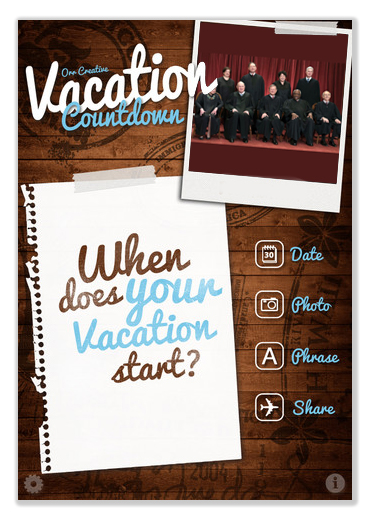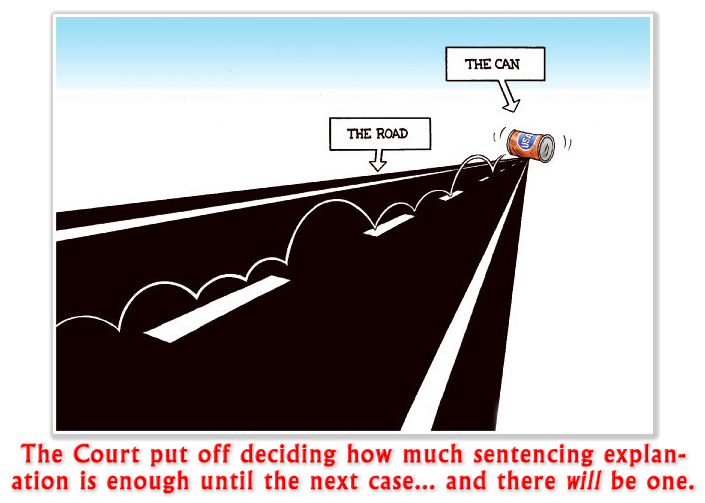We post news and comment on federal criminal justice issues, focused primarily on trial and post-conviction matters, legislative initiatives, and sentencing issues.
HIGH COURT DECIDES A COUPLE OF PROCEDURAL ISSUES, DRY BUT IMPORTANT
 I had no sooner gotten done writing in yesterday morning’s newsletter to federal inmates that the Supreme Court still had a plateful of decisions to hand down – including five criminal cases – than the Court reduced its remaining opinion load by 25 percent, dropping five decisions at Monday’s session, including two federal criminal procedure opinions.
I had no sooner gotten done writing in yesterday morning’s newsletter to federal inmates that the Supreme Court still had a plateful of decisions to hand down – including five criminal cases – than the Court reduced its remaining opinion load by 25 percent, dropping five decisions at Monday’s session, including two federal criminal procedure opinions.
For those keeping score, SCOTUS has 14 opinions yet to issue, and has scheduled an extra opinion day for Thursday this week in order to push decisions out the door before vacation begins on June 30th.
SUPREME COURT SAYS GUIDELINES ERROR ALMOST ALWAYS WARRANTS RELIEF
Every year, a lot of sentencing guidelines mistakes appear in presentence reports but never get caught by defense counsel or the court.
 On appeal, errors not raised in the district court may only be addressed by Federal Rule of Criminal Procedure 52(b), and then only as long as (1) the error was not “intentionally relinquished or abandoned,” (2) the error is plain, and (3) the error “affected the defendant’s substantial rights.” If those conditions are met, “the court of appeals should exercise its discretion to correct the forfeited error if the error “seriously affects the fairness, integrity or public reputation of judicial proceedings.” These standards were adopted by the Supreme Court in United States v. Olano. Thus, an appellant wanting to raise a mistake at sentencing to which no one objected has to ring Olano’s first three bells. If he or she does that, the Court of Appeals then muses about whether the error seriously affected the fairness, integrity or public reputation of judicial proceedings – you might say, whether it makes the courts look bad – and, if it does, the Court of Appeals will do something about it. Maybe.
On appeal, errors not raised in the district court may only be addressed by Federal Rule of Criminal Procedure 52(b), and then only as long as (1) the error was not “intentionally relinquished or abandoned,” (2) the error is plain, and (3) the error “affected the defendant’s substantial rights.” If those conditions are met, “the court of appeals should exercise its discretion to correct the forfeited error if the error “seriously affects the fairness, integrity or public reputation of judicial proceedings.” These standards were adopted by the Supreme Court in United States v. Olano. Thus, an appellant wanting to raise a mistake at sentencing to which no one objected has to ring Olano’s first three bells. If he or she does that, the Court of Appeals then muses about whether the error seriously affected the fairness, integrity or public reputation of judicial proceedings – you might say, whether it makes the courts look bad – and, if it does, the Court of Appeals will do something about it. Maybe.
If you ever wanted to see the legal equivalent of a stacked deck, Olano’s “plain error” test is it.
The issue in the first of yesterday’s decisions, Rosales-Mireles v. United States, was whether a Guidelines error that satisfies Olano’s first three conditions warrants relief under the fourth prong. The 5th Circuit, not content with loaded dice Olano had already given it, decided that unless the complained-of error “shocked the conscience,” it did not meet Olano’s fourth prong. This is tough for people like me, because the older I get, the harder it is for my conscience to be shocked. And unsurprisingly, the ages of the judges on the courts of appeal skew much more toward Metamucil than they do Monster energy drinks. So (and this will come as no surprise), the 5th’s conscience is not easily shocked.
 Florencio Rosales-Mireles pleaded guilty to illegal reentry into the United States. In calculating the Guidelines range, the Probation Office’s presentence report mistakenly counted a state misdemeanor conviction twice. As a result, the report yielded a Guidelines range of 77 to 96 months, when the correctly calculated range would have been 70 to 87 months. No one caught the mistake at sentencing.
Florencio Rosales-Mireles pleaded guilty to illegal reentry into the United States. In calculating the Guidelines range, the Probation Office’s presentence report mistakenly counted a state misdemeanor conviction twice. As a result, the report yielded a Guidelines range of 77 to 96 months, when the correctly calculated range would have been 70 to 87 months. No one caught the mistake at sentencing.
On appeal, Flo challenged the incorrect Guidelines range for the first time. The 5th Circuit found that the Guidelines error was plain and that it affected Flo’s substantial rights because there was a “reasonable probability that he would have been subject to a different sentence but for the error.” The Circuit nevertheless declined to remand the case for resentencing, concluding that Flo had not established that the error would seriously affect the fairness, integrity, or public reputation of judicial proceedings because neither the error nor the resulting sentence “would shock the conscience.”
 As an aside, I would observe that someone whose conscience is not shocked that a judicial blunder would deprive a human of liberty for as much as 26 months has never been locked up. But no matter. The defendants serve the sentences, not the judges.
As an aside, I would observe that someone whose conscience is not shocked that a judicial blunder would deprive a human of liberty for as much as 26 months has never been locked up. But no matter. The defendants serve the sentences, not the judges.
But to its credit, the Supreme Court disagreed with the 5th Circuit. Yesterday’s decision held that a miscalculation of a Guidelines sentencing range that has been determined to be plain and to affect a defendant’s substantial rights requires a court of appeals to exercise its discretion under Rule 52(b) to vacate the defendant’s sentence “in the ordinary case.”
Although Rule 52(b) is permissive, not mandatory, the Court said, it is well established that courts “should” correct a forfeited plain error affecting substantial rights “if the error ‘seriously affects the fairness, integrity or public reputation of judicial proceedings.” The 5th Circuit’s shock-the-conscience standard too narrowly confines the extent of the court of appeals’ discretion. It is not reflected in Rule 52(b), nor in how the plain-error doctrine has been applied by the Supreme Court, which has before reversed judgments for plain error based on inadvertent or unintentional errors by the court or the parties. The errors are not required to amount to a “powerful indictment” of the system.
An error resulting in a higher range than the Guidelines provide usually establishes a reasonable probability that a defendant will serve a prison sentence greater than “necessary” to fulfill the purposes of incarceration. That risk of unnecessary deprivation of liberty particularly undermines the fairness, integrity, or public reputation of judicial proceedings in the context of a plain Guidelines error, the Court said, because Guidelines miscalculations ultimately result from judicial error, as the district court is charged in the first instance with ensuring the Guidelines range it considers is correct.
 Ringing the first three Olano bells will not make 52(b) relief inevitable, however, the Court ruled, because any exercise of discretion at the fourth prong of Olano inherently requires “a case-specific and fact-intensive” inquiry. Countervailing factors may satisfy the court of appeals that the fairness, integrity, and public reputation of the proceedings will be preserved absent correction. But for now, an appellate judge’s conscience need not be shocked in order for him to do the right thing.
Ringing the first three Olano bells will not make 52(b) relief inevitable, however, the Court ruled, because any exercise of discretion at the fourth prong of Olano inherently requires “a case-specific and fact-intensive” inquiry. Countervailing factors may satisfy the court of appeals that the fairness, integrity, and public reputation of the proceedings will be preserved absent correction. But for now, an appellate judge’s conscience need not be shocked in order for him to do the right thing.
Rosales-Mireles v. United States, Case No. 16-9463 (June 18, 2018)

COURT LEAVES QUESTION OF ADEQUACY OF DISTRICT COURT EXPLANATION FOR SENTENCE TO ANOTHER DAY
Adaucto Chavez-Meza pled guilty to possessing methamphetamine with intent to distribute. The judge reviewed the Guidelines, determined the range to be 135 to 168 months, and imposed a sentence at the bottom of the range. The Sentencing Commission later lowered the relevant range to 108 to 135 months, and Adaucto sought a sentence reduction under 18 USC 3582(c)(2) to the bottom of the new range. The judge reduced his sentence to 114 months instead. The order was entered on a form certifying that the judge had “considered” Adaucto’s “motion” and had “taken into account” the 18 USC 3553(a) factors and the relevant Guidelines policy statement.
On appeal, Adaucto argued the sentencing judge did not adequately explain why he rejected petitioner’s request for a 108-month sentence. The 10th Circuit Court of Appeals disagreed.
 A lot of us thought the Supreme Court would use this case to explain the degree of detail a judge had to provide on sentences, even in-Guidelines sentences. But yesterday the Court punted, holding simply that because the record as a whole demonstrated the judge had a reasoned basis for his decision, the judge’s explanation for Adaucto’s sentence reduction was adequate.
A lot of us thought the Supreme Court would use this case to explain the degree of detail a judge had to provide on sentences, even in-Guidelines sentences. But yesterday the Court punted, holding simply that because the record as a whole demonstrated the judge had a reasoned basis for his decision, the judge’s explanation for Adaucto’s sentence reduction was adequate.
The government argued Adaucto was not entitled to an explanation at all because the statute governing sentence-modification motions does not expressly require a sentencing judge to state his reasons for imposing a particular sentence at all. While implying it might have sympathy to that view, the Court said, “it is unnecessary to go as far as the government urges, however, because, even assuming the District Court had a duty to explain its reasons when modifying petitioner’s sentence, what the court did here was sufficient.”
Chavez-Meza v. United States, Case No. 17–5639 (June 18, 2018)
– Thomas L. Root

